Let’s be honest, between juggling work, family, and the occasional attempt at self-care, it’s easy to overlook the tiny nutrients that keep our bodies running smoothly. Vitamins might be small, but they play a huge role in our health. They’re essential for everything from energy production and immune support to growth and development. Even in our modern world, vitamin deficiencies can sneak up on us, leading to serious health issues.
Guide to Understanding Each Vitamin
This guide breaks down the main vitamins, from A to K, highlighting their functions, signs of deficiency, and the best food sources to keep you and your family thriving.
Vitamin A: Your Eyes, Immunity, and More
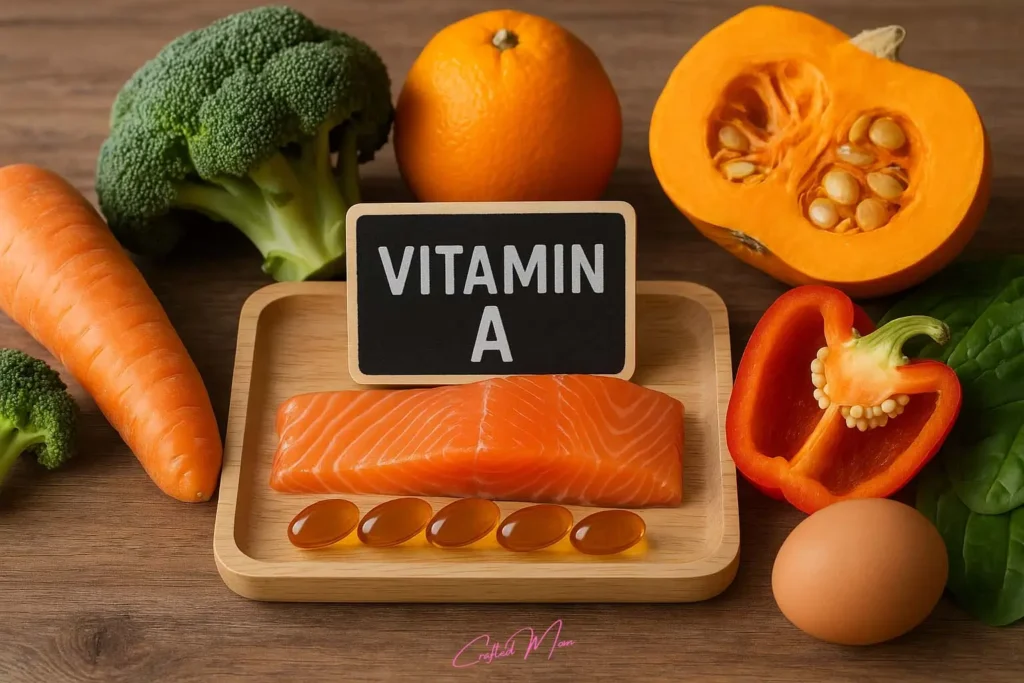
Let’s talk about vitamin A, the unsung hero behind your night vision, immune strength, and even your skin’s glow. It’s a fat-soluble vitamin that plays a big role in keeping your body running smoothly.
Why You Need Vitamin A
Vitamin A helps:
- Maintain healthy vision, especially in low light
- Support immune function by maintaining mucous barriers and aiding white blood cell production
- Promote bone growth and reproduction
- Keep skin and mucous membranes healthy
According to the Mayo Clinic, vitamin A supports growth, vision, and cell function.
Signs of Vitamin A Deficiency
While rare in developed countries, a lack of vitamin A can lead to:
- Night blindness
- Dry eyes and skin
- Increased susceptibility to infections
The Cleveland Clinic notes that early signs of vitamin A deficiency include night blindness and dry eyes.
Best Food Sources of Vitamin A
You can get vitamin A from:
- Animal sources: liver, eggs, butter, cheese, oily fish
- Plant sources: sweet potatoes, carrots, spinach, kale, cantaloupe
Healthline lists liver, fish, and dairy products as top sources of vitamin A.
Or Try a Trusted Supplement:
If you’re not getting enough from food, or just want extra support, Nature’s Bounty Vitamin B1 100mg is a great pick. It’s easy to take, Non-GMO, and supports energy metabolism and nervous system health.
✅ Pro Tips
- Pair vitamin A-rich foods with healthy fats like olive oil to boost absorption.
- Be cautious with supplements; too much vitamin A can be harmful.
WebMD advises that while vitamin A is essential, excessive intake from supplements can lead to toxicity.
Give your body the boost it deserves, try Bronson Vitamin A 10,000 IU for healthy vision, immunity, and more. Grab it on Amazon and feel the difference!
Vitamin B1 (Thiamine): Your Body’s Spark Plug
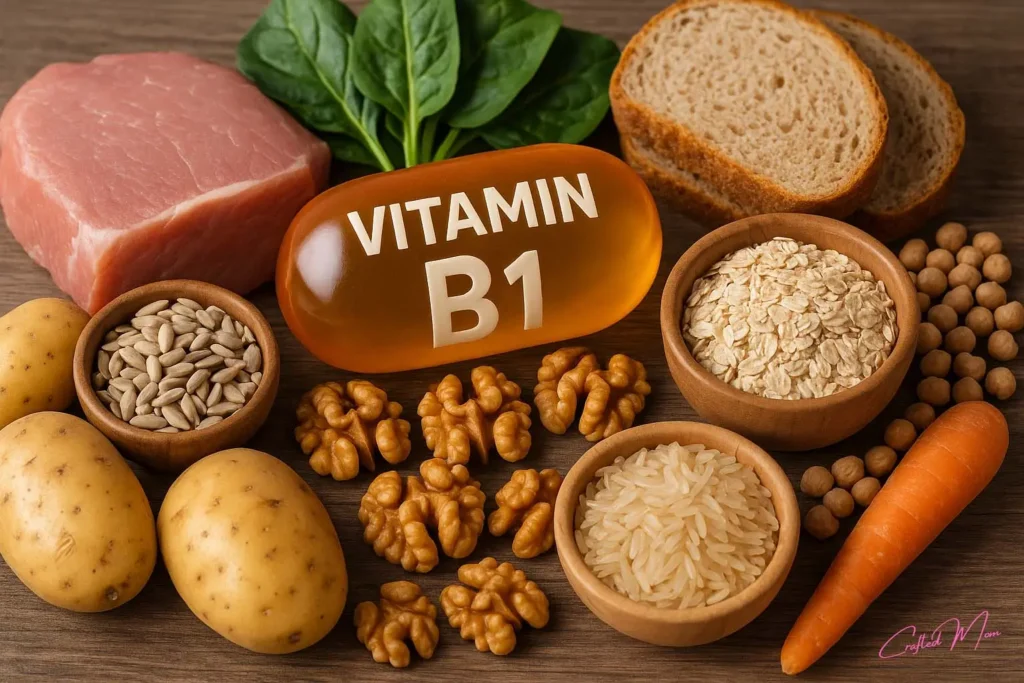
Let’s chat about vitamin B1, also known as thiamine. It’s like the ignition key for your body’s energy production. Without it, your cells can’t effectively convert food into fuel, leaving you feeling like you’re running on empty.
Why You Need Vitamin B1
Thiamine plays a crucial role in:
- Converting carbohydrates into energy
- Supporting nerve function and muscle contraction
- Maintaining healthy skin and brain function
According to the NHS, thiamine helps the body break down and release energy from food and keeps the nervous system healthy.
Signs of Vitamin B1 Deficiency
Thiamine deficiency can lead to:
- Fatigue and irritability
- Nerve damage (tingling or numbness in hands and feet)
- Muscle weakness
- Beriberi: a condition affecting the heart and nervous system
The Cleveland Clinic notes that low thiamine levels can cause a range of symptoms, including fatigue, loss of appetite, and behavioral changes.
Best Food Sources of Vitamin B1
You can boost your thiamine intake with:
- Pork and liver
- Whole grains and fortified cereals
- Legumes like beans and lentils
- Nuts and seeds
- Eggs and dairy products
Harvard’s Nutrition Source highlights that thiamine is found naturally in meats, fish, and whole grains, and is also added to breads and cereals. (hsph.harvard.edu)
Or Try a Trusted Supplement:
Not always getting enough B1 from food? Nature Made Vitamin B1 100mg is an easy, reliable way to support energy metabolism and nervous system health.
✅ Quick Tips
- Limit alcohol consumption, as it can interfere with thiamine absorption.
- Consider a multivitamin if your diet lacks variety.
- Consult a healthcare provider before starting any supplements.
Vitamin B2 (Riboflavin): Your Energy and Wellness Ally
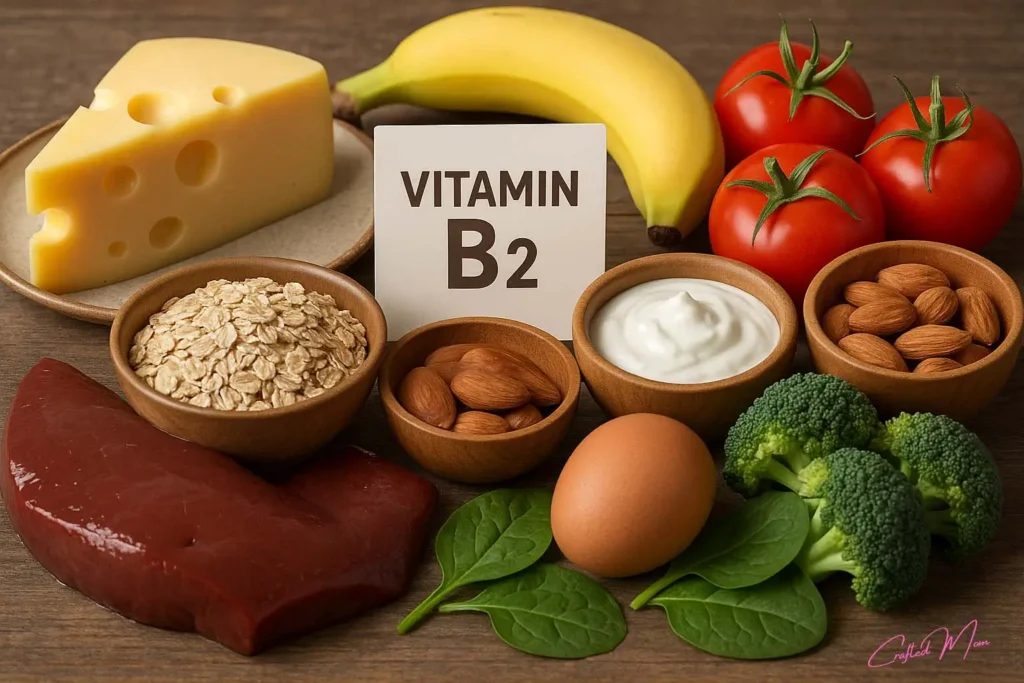
Let’s talk about vitamin B2, or riboflavin, a key player in keeping our energy levels up and our bodies functioning smoothly. It’s essential for converting the food we eat into the energy we need, and it supports healthy skin, eyes, and nerves.
Why You Need Vitamin B2
Riboflavin helps:
- Break down proteins, fats, and carbohydrates for energy
- Maintain healthy skin and eyes
- Support the nervous system
- Aid in the production of red blood cells
According to Medical News Today, riboflavin plays a vital role in maintaining the body’s energy supply and supports the metabolism of fats, drugs, and steroid hormones.
Signs of Vitamin B2 Deficiency
While riboflavin deficiency is rare in developed countries, it can occur, especially in individuals with poor diets or certain medical conditions. Symptoms may include:
- Cracks and sores at the corners of the mouth
- Swollen, red tongue
- Dry, itchy skin
- Sensitivity to light and eye fatigue
Mount Sinai notes that severe deficiency can lead to fatigue, blurred vision, and even depression. Mount Sinai Health System
Best Food Sources of Vitamin B2
You can boost your riboflavin intake with:
- Dairy products like milk and yogurt
- Eggs
- Lean meats and organ meats
- Leafy green vegetables
- Mushrooms and almonds
Medical News Today highlights that riboflavin is found naturally in these foods and is also added to some fortified cereals.
Or Try a Trusted Supplement:
If food sources aren’t cutting it, Nutricost Vitamin B2 (Riboflavin) 400mg is a solid pick. It’s gluten-free, non-GMO, and easy to add to your routine.
✅ Quick Tips
- Store riboflavin-rich foods in opaque containers, as exposure to light can degrade the vitamin.
- Include a variety of these foods in your diet to maintain adequate levels.
- Consult with a healthcare provider before starting any new supplements.
Vitamin B3 (Niacin): Fueling Your Body and Mind
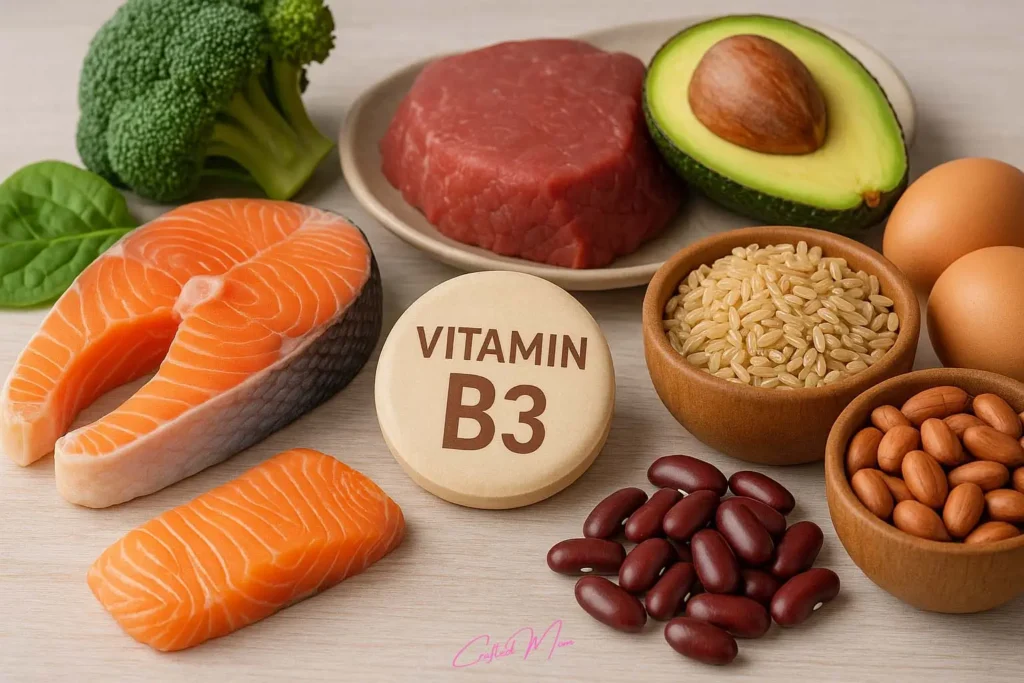
Let’s talk about vitamin B3, also known as niacin. This essential nutrient plays a vital role in converting the food we eat into energy, supporting our metabolism, and maintaining healthy skin and nerves. It’s like the spark plug that keeps our body’s engine running smoothly.
Why You Need Vitamin B3
Niacin is crucial for:
- Converting carbohydrates, fats, and proteins into usable energy
- Supporting healthy skin and nerve function
- Maintaining digestive health
- Assisting in DNA repair and stress responses
According to the Harvard T.H. Chan School of Public Health, niacin is essential for energy production and overall cellular function.
Signs of Vitamin B3 Deficiency
A lack of niacin can lead to pellagra, characterized by the “three D’s”:
- Diarrhea
- Dermatitis (especially in sun-exposed areas)
- Dementia
If left untreated, pellagra can be fatal.
Best Food Sources of Vitamin B3
To keep your niacin levels in check, include these foods in your diet:
- Poultry (chicken, turkey)
- Tuna and other fish
- Mushrooms
- Peanuts and peanut butter
- Fortified cereals and grains
The National Institutes of Health notes that these foods are excellent sources of niacin.
Or Try a Trusted Supplement:
Looking for a flush-free way to support your skin, brain, and energy? Nutricost Niacinamide (Vitamin B3) 500mg is non-GMO, gluten-free, and gentle on the system.
✅ Quick Tips
- Cooking methods like boiling can reduce niacin content; opt for steaming or grilling when possible.
- Alcohol consumption can interfere with niacin absorption; moderation is key.
- Consult a healthcare provider before starting any supplements, as excessive intake can have side effects.
Vitamin B5 (Pantothenic Acid): The Metabolism Maestro
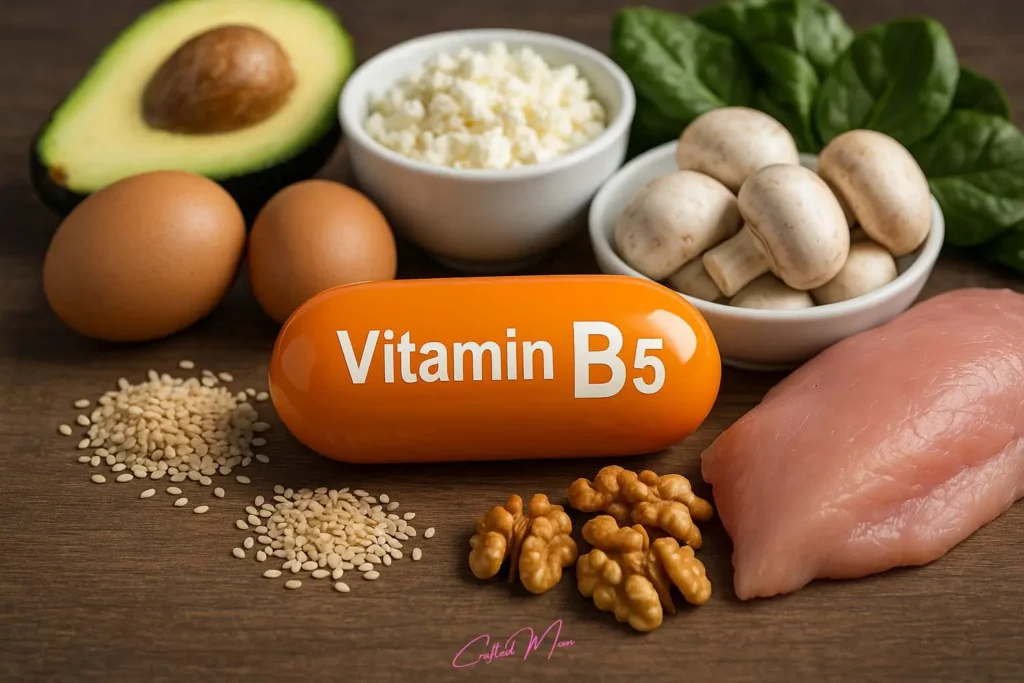
Let’s dive into vitamin B5, also known as pantothenic acid. This essential nutrient plays a pivotal role in converting the food we eat into the energy we need, supporting the production of lipids, hormones, and neurotransmitters. It’s like the behind-the-scenes director ensuring everything runs smoothly.
Why You Need Vitamin B5
Pantothenic acid is crucial for:
- Breaking down fats and carbohydrates for energy
- Synthesizing cholesterol and steroid hormones
- Producing coenzyme A, vital for numerous biochemical reactions
- Maintaining healthy skin, hair, and eyes
According to the National Institutes of Health, pantothenic acid helps turn the food you eat into the energy you need.
Signs of Vitamin B5 Deficiency
While deficiency is rare, it can occur, especially in individuals with severe malnutrition. Symptoms may include:
- Fatigue and irritability
- Numbness or burning sensations in hands and feet
- Muscle cramps and sleep disturbances
- Digestive issues like nausea and abdominal cramps (The Nutrition Source)
The Harvard T.H. Chan School of Public Health notes that deficiency symptoms may include headache, fatigue, irritability, and numbness or burning sensation in hands or feet.
Best Food Sources of Vitamin B5
Pantothenic acid is found in a wide variety of foods. Top sources include:
- Chicken, beef, and organ meats
- Eggs and dairy products
- Avocados, broccoli, and mushrooms
- Whole grains and legumes
The NIH Office of Dietary Supplements states that pantothenic acid is naturally present in almost all foods, including beef, poultry, seafood, eggs, milk, vegetables like mushrooms and avocados, and whole grains.
Or Try a Trusted Supplement:
Need help covering your B5 needs? NOW Foods Pantothenic Acid (Vitamin B5) 500mg delivers reliable energy and stress support in one easy capsule.
✅ Quick Tips
- Include a variety of these foods in your diet to maintain adequate levels.
- Be cautious with supplements; excessive intake can lead to mild side effects like diarrhea.
- Consult with a healthcare provider before starting any new supplements.
Vitamin B6 (Pyridoxine): The Mood and Energy Booster
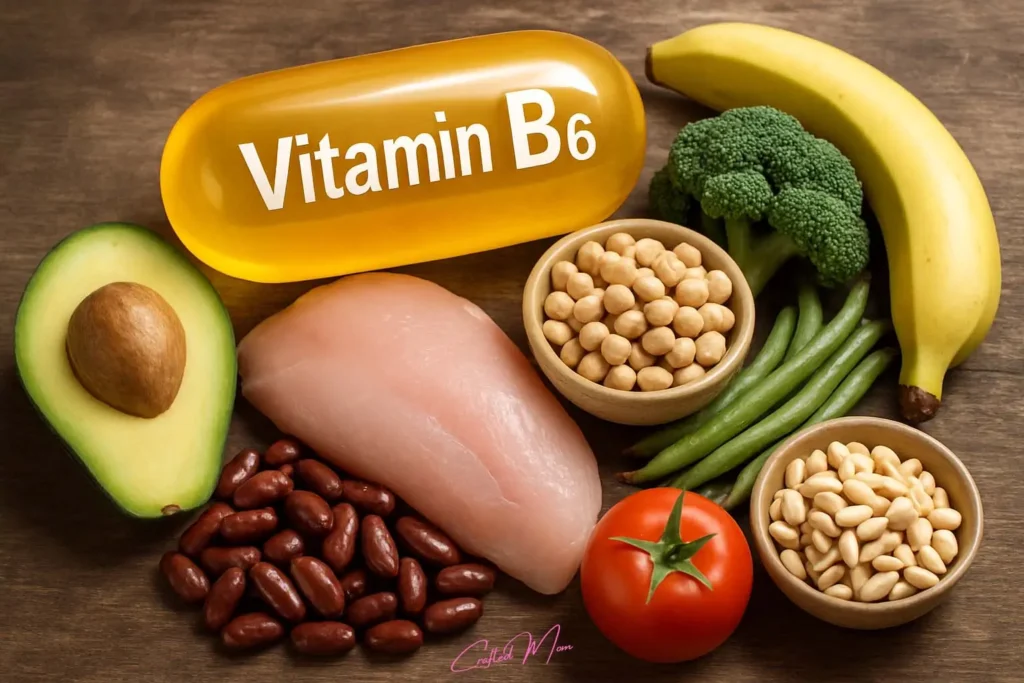
Let’s talk about vitamin B6, also known as pyridoxine. This essential nutrient plays a vital role in our overall well-being, from regulating mood and sleep to supporting red blood cell production.
Why You Need Vitamin B6
Vitamin B6 is crucial for:
- Producing neurotransmitters like serotonin and melatonin, which regulate mood and sleep
- Forming hemoglobin, the protein in red blood cells that carries oxygen throughout the body
- Supporting immune function and brain health
Signs of Vitamin B6 Deficiency
While vitamin B6 deficiency is uncommon in developed countries, it can occur, especially in individuals with certain medical conditions or dietary restrictions. Symptoms may include:
- Fatigue and irritability
- Depression and confusion
- Weakened immune function
- Anemia
Best Food Sources of Vitamin B6
To maintain adequate vitamin B6 levels, incorporate these foods into your diet:
- Bananas
- Potatoes
- Legumes like chickpeas and lentils
- Fish such as salmon and tuna
- Poultry like chicken and turkey
Or Try a Trusted Supplement:
Need a little B6 backup? Nature’s Bounty Vitamin B6 100mg supports energy metabolism and nervous system health, perfect for busy days.
✅ Quick Tips
- Cooking methods like boiling can reduce vitamin B6 content; opt for steaming or grilling when possible.
- If you have concerns about your vitamin B6 intake, consult with a healthcare provider before starting any supplements.
Vitamin B7 (Biotin): The Beauty and Metabolism Booster
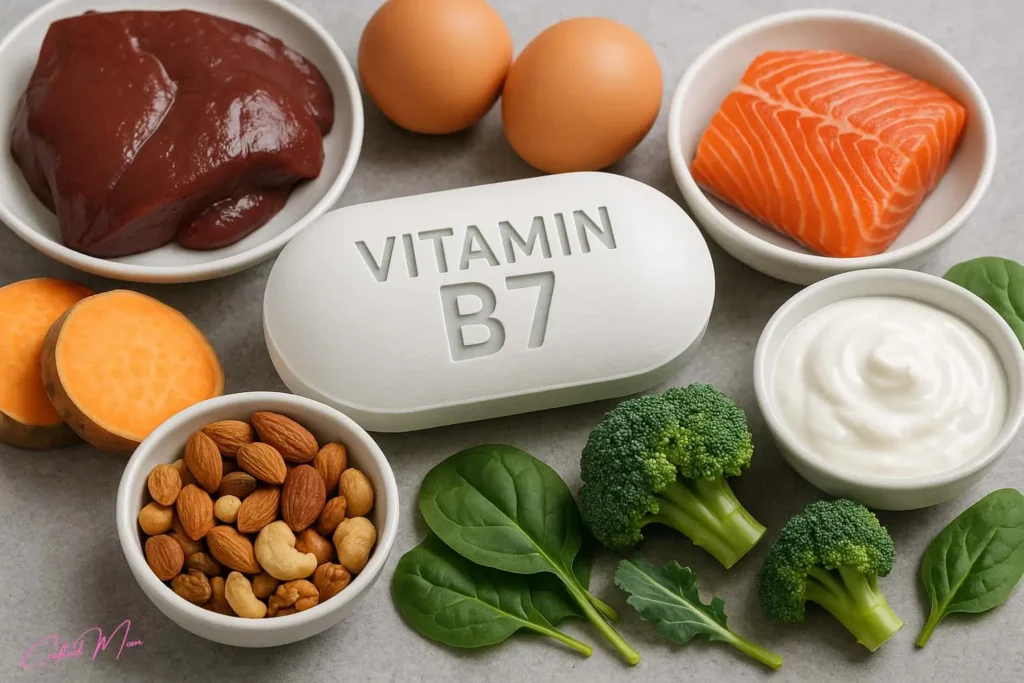
Let’s talk about vitamin B7, commonly known as biotin. This essential nutrient plays a crucial role in converting the food we eat into energy and supports the health of our hair, skin, and nails.
Why You Need Vitamin B7
Biotin is vital for:
- Metabolizing fats, carbohydrates, and proteins
- Supporting healthy hair, skin, and nails
- Maintaining a healthy nervous system
According to the National Institutes of Health, biotin is essential for energy metabolism and plays a role in gene regulation and cell signaling. (Allure)
Signs of Vitamin B7 Deficiency
Biotin deficiency is rare but can occur, especially in individuals who consume raw egg whites over extended periods. Raw egg whites contain avidin, a protein that binds biotin and prevents its absorption. Symptoms of deficiency may include:
- Thinning hair or hair loss
- Skin rashes, particularly around the eyes, nose, and mouth
- Fatigue and depression
A case report highlighted a 62-year-old woman who developed biotin deficiency after consuming six raw eggs daily for 18 months.
Best Food Sources of Vitamin B7
Biotin is found in a variety of foods, including:
- Organ meats like liver
- Egg yolks
- Nuts and seeds
- Fish such as salmon
- Dairy products
- Vegetables like sweet potatoes, spinach, and broccoli
The Harvard T.H. Chan School of Public Health notes that these foods are excellent sources of biotin.
Or Try a Trusted Supplement:
Want healthier hair, skin, and nails? Nutricost Biotin (Vitamin B7) 10,000mcg offers a high-potency, quick-release formula that’s vegetarian and gluten-free.
✅ Quick Tips
- Cooking egg whites deactivates avidin, making biotin available for absorption.
- A balanced diet typically provides sufficient biotin; supplements are usually unnecessary unless advised by a healthcare provider.
- High doses of biotin supplements can interfere with certain lab tests, including those for thyroid function.
Vitamin B9 (Folate): The Cell Builder and Baby Protector
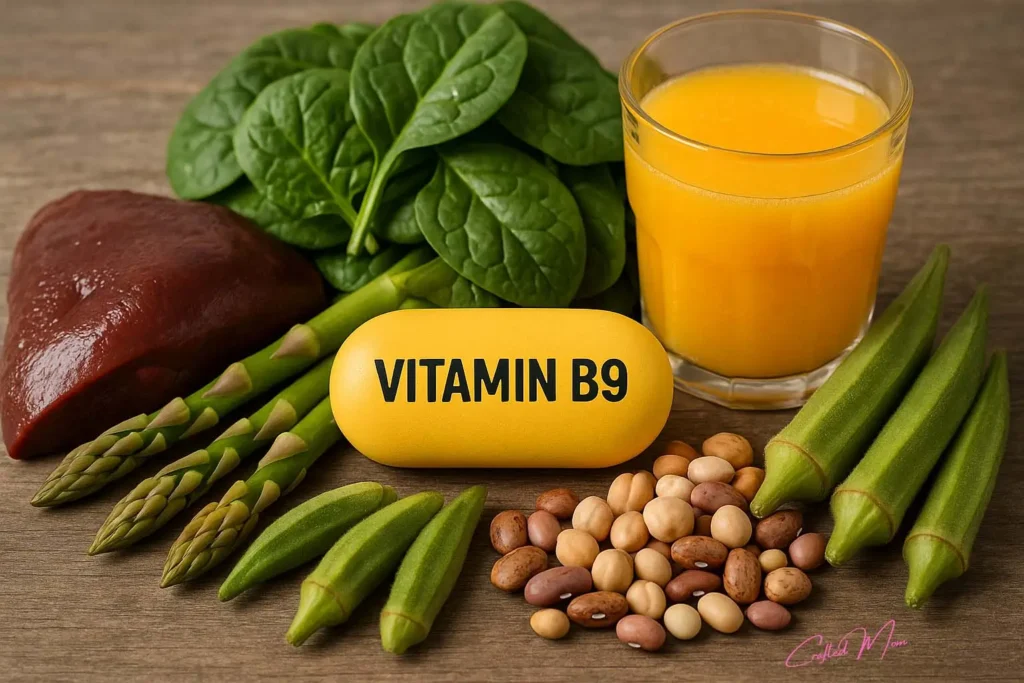
Let’s chat about vitamin B9, commonly known as folate. This essential nutrient is a powerhouse for cell growth and plays a pivotal role during pregnancy, especially in the early stages.
Why You Need Vitamin B9
Folate is crucial for:
- DNA and RNA synthesis, aiding in the production and repair of our genetic material.
- Formation of red blood cells, preventing anemia.
- Supporting rapid cell division and growth during infancy and pregnancy.
- Reducing the risk of neural tube defects in developing fetuses, such as spina bifida and anencephaly.
The Harvard T.H. Chan School of Public Health emphasizes that folate is vital during periods of rapid growth, like pregnancy and fetal development.
Signs of Vitamin B9 Deficiency
While folate deficiency is rare in developed countries, certain groups may be at risk, including pregnant women, individuals with alcohol use disorder, and those with malabsorptive conditions. Symptoms can include:
- Fatigue and weakness.
- Irritability and difficulty concentrating.
- Shortness of breath.
- Pale skin.
A deficiency during pregnancy can lead to serious birth defects, emphasizing the importance of adequate intake .
Top Food Sources of Vitamin B9
Incorporate these folate-rich foods into your diet:
- Asparagus: Five cooked spears provide about 100 mcg of folate .
- Spinach: Half a cup of cooked spinach offers approximately 121-139 mcg .
- Okra: Half a cup of cooked okra contains around 97 mcg .
- Orange Juice: A cup of 100% orange juice provides about 80 mcg .
- Legumes: Lentils and chickpeas are excellent sources, with lentils offering up to 265 mcg per ¾ cup.
Or Try a Trusted Supplement:
Need extra folate, especially during pregnancy or busy seasons? Nutricost Folic Acid (Vitamin B9) 1000 mcg is a simple, effective option.
✅ Quick Tips
- Cooking Matters: Folate is water-soluble and can be lost during cooking. To retain its benefits, consider steaming or microwaving vegetables instead of boiling them.
- Supplement Wisely: If you’re planning to become pregnant, it’s recommended to take a daily supplement containing 400-800 mcg of folic acid .
- Balanced Diet: Incorporate a variety of folate-rich foods into your meals to meet your daily requirements.
Vitamin B12 (Cobalamin): The Brain and Blood Powerhouse
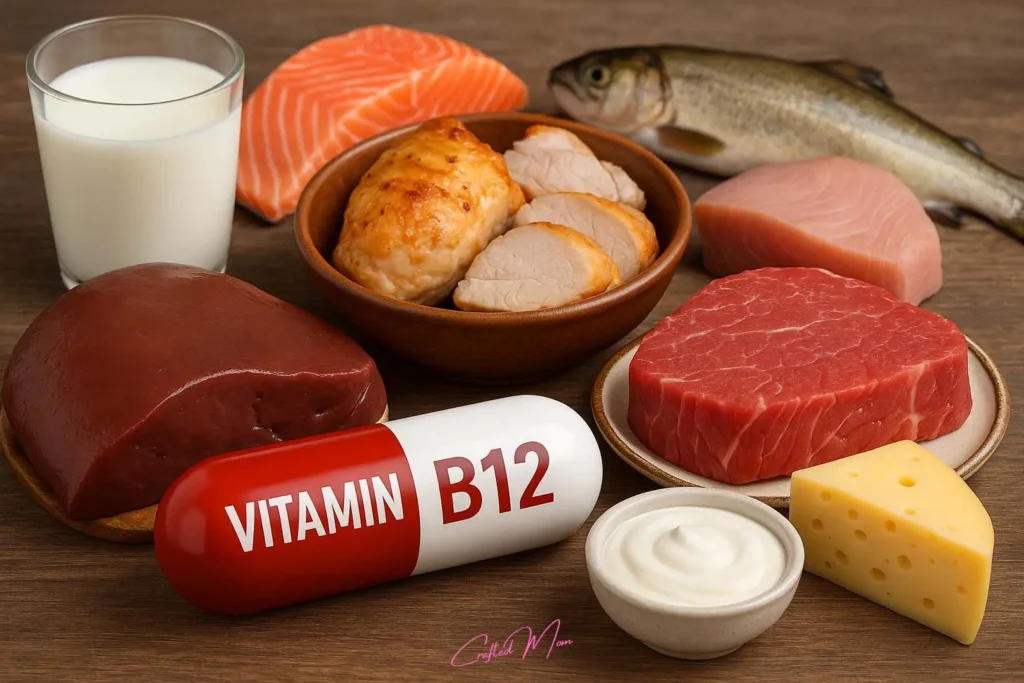
Let’s talk about vitamin B12, also known as cobalamin. This essential nutrient is crucial for maintaining healthy nerve cells, supporting red blood cell formation, and aiding in DNA synthesis.
Why You Need Vitamin B12
Vitamin B12 is vital for:
- DNA synthesis and repair, ensuring proper cell division and function.
- Red blood cell formation, preventing anemia and promoting oxygen transport.
- Nervous system maintenance, supporting nerve cell health and function.
According to the National Institutes of Health, vitamin B12 is essential for neurological function and the formation of red blood cells.
Signs of Vitamin B12 Deficiency
Vitamin B12 deficiency can manifest in various ways, including:
- Megaloblastic anemia, leading to fatigue and weakness.
- Neurological symptoms such as tingling in the hands and feet, difficulty walking, and memory issues.
- Cognitive disturbances, including confusion and mood changes.
The Cleveland Clinic notes that vitamin B12 deficiency can cause symptoms like numbness, tingling sensations, and muscle weakness. (Cleveland Clinic)
Best Food Sources of Vitamin B12
Vitamin B12 is naturally found in animal products, including:
- Meat (beef, pork, lamb)
- Poultry (chicken, turkey)
- Fish (salmon, tuna, trout)
- Dairy products (milk, cheese, yogurt)
- Eggs
For those following a vegetarian or vegan diet, fortified foods like breakfast cereals and plant-based milk alternatives can provide vitamin B12. However, supplementation may be necessary to meet daily requirements.
Or Try a Trusted Supplement:
Feeling low on energy? Nature Made Vitamin B12 1000 mcg helps support energy metabolism and nervous system function, no prescriptions needed.
✅ Quick Tips
- Monitor your intake: Ensure you’re consuming enough vitamin B12 through diet or supplements, especially if you’re over 60, vegan, or have digestive issues.
- Consult a healthcare provider: Before starting any supplementation, discuss with a professional to determine the appropriate dosage and form.
- Be aware of absorption issues: Certain conditions and medications can affect vitamin B12 absorption, necessitating alternative intake methods like injections.
Vitamin C (Ascorbic Acid): The Immunity and Healing Hero
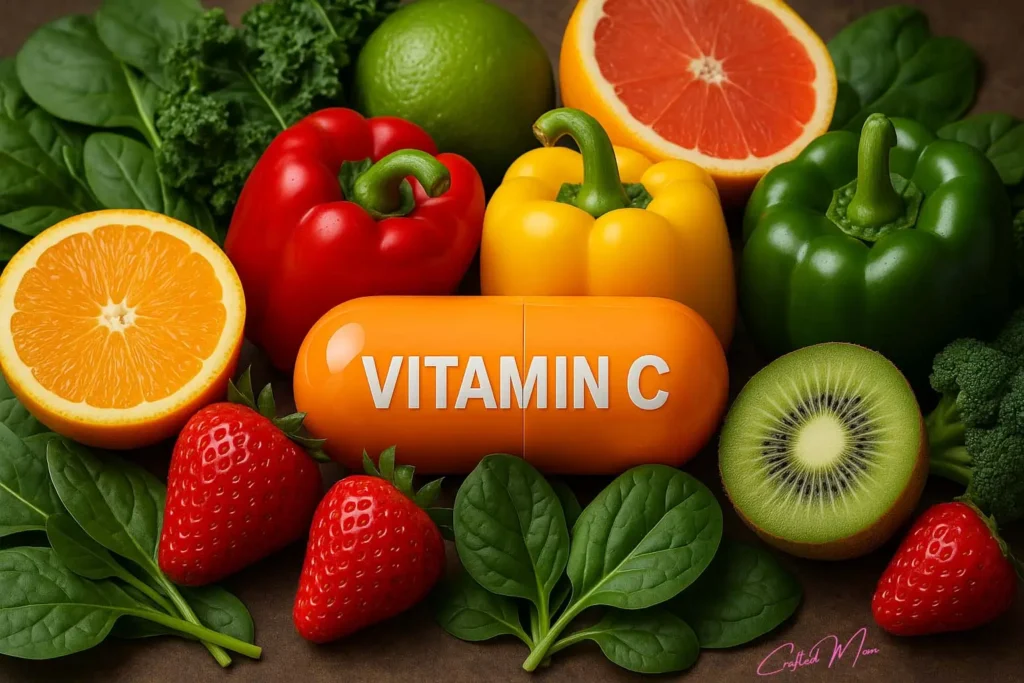
Let’s talk about vitamin C, also known as ascorbic acid. This essential nutrient is a powerhouse for your immune system and plays a vital role in wound healing and maintaining healthy gums.
Why You Need Vitamin C
Vitamin C is crucial for:
- Boosting the immune system, helping your body fight off infections.
- Collagen production, which is essential for wound healing and maintaining the integrity of skin and connective tissues.
- Protecting cells from oxidative stress, acting as a powerful antioxidant.
- Enhancing iron absorption from plant-based foods, preventing anemia.
According to the Cleveland Clinic, vitamin C encourages collagen growth, which is an important part of your body’s healing process. It’s one of the keys to properly healing wounds, including cuts, scrapes, and surgical incisions. People who don’t get enough vitamin C have been shown to heal more slowly than those who get the recommended amount.
Signs of Vitamin C Deficiency
Vitamin C deficiency can lead to a condition called scurvy, which is rare but still occurs, especially in individuals with limited access to fresh fruits and vegetables. Symptoms include:
- Fatigue and weakness.
- Swollen, bleeding gums and tooth loss.
- Joint pain and swelling.
- Anemia.
- Slow wound healing.
The Cleveland Clinic notes that scurvy symptoms may start to develop after a few months of not getting enough vitamin C in your diet.
Top Food Sources of Vitamin C
To ensure adequate vitamin C intake, incorporate these foods into your diet:
- Citrus fruits: oranges, grapefruits, lemons, and limes.
- Bell peppers: red, green, and yellow varieties.
- Strawberries: a sweet and versatile source.
- Leafy greens: spinach, kale, and broccoli.
- Kiwi: a small fruit packed with vitamin C.
Healthline highlights that vitamin C is especially plentiful in citrus fruits and vegetables, particularly cruciferous vegetables like broccoli.
Or Try a Trusted Supplement:
Need a reliable immune boost? Nature’s Bounty Vitamin C 1000mg supports immune and antioxidant health with a high-potency dose in each caplet.
✅ Quick Tips
- Consume raw or lightly cooked vegetables to preserve vitamin C content, as it can be destroyed by heat.
- Pair vitamin C-rich foods with iron-rich plant foods to enhance iron absorption.
- Store fruits and vegetables properly to prevent vitamin C degradation over time.
Maintaining adequate vitamin C levels is essential for overall health, supporting your immune system, and ensuring proper wound healing.
Vitamin D (Calciferol): The Sunshine Vitamin for Strong Bones
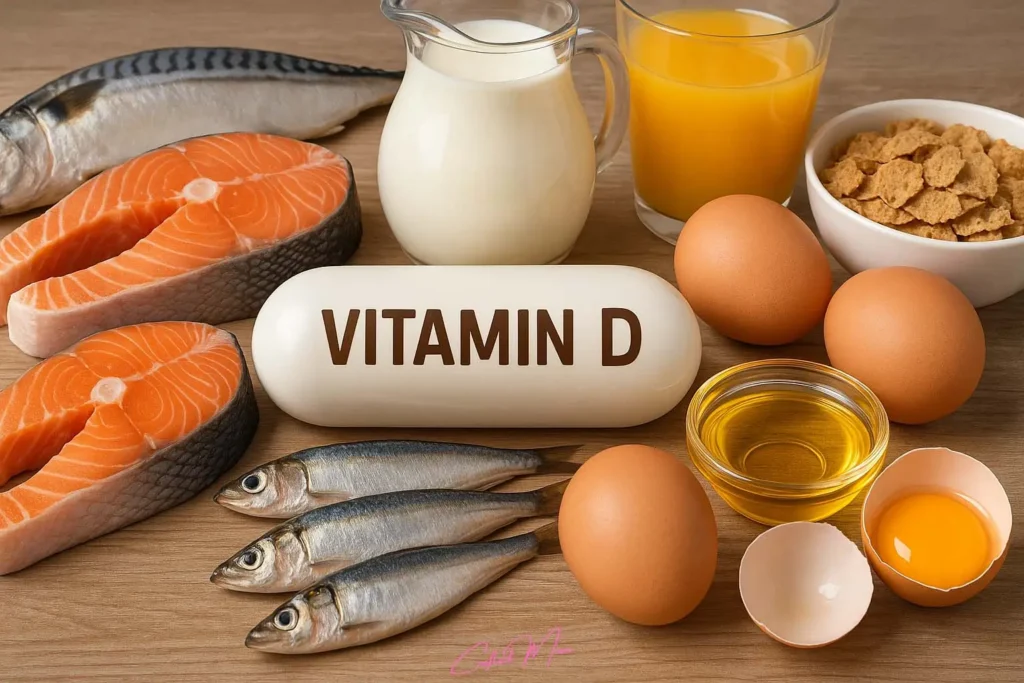
Let’s talk about vitamin D, often dubbed the “sunshine vitamin.” This essential nutrient plays a pivotal role in maintaining bone health, supporting the immune system, and even influencing our mood.
Why You Need Vitamin D
Vitamin D is crucial for:
- Calcium and phosphorus absorption, ensuring strong and healthy bones.
- Immune system support, helping your body fend off illnesses.
- Mood regulation, with studies linking adequate levels to reduced risk of depression.
According to the National Institutes of Health, vitamin D promotes calcium absorption in the gut and maintains adequate serum calcium and phosphate concentrations to enable normal bone mineralization.
Signs of Vitamin D Deficiency
Vitamin D deficiency can lead to several health issues:
- In children, it can cause rickets, leading to soft and weak bones, skeletal deformities, and growth disturbances.
- In adults, deficiency may result in osteomalacia, characterized by bone pain and muscle weakness.
- Other symptoms include fatigue, frequent infections, and mood changes.
Top Food Sources of Vitamin D
Incorporate these vitamin D-rich foods into your diet:
- Fatty fish: salmon, mackerel, and sardines.
- Cod liver oil: a potent source of vitamin D.
- Egg yolks: contain vitamin D, especially from pasture-raised chickens.
- Fortified foods: milk, orange juice, and cereals often have added vitamin D.
Healthline notes that cod liver oil provides about 450 IU per teaspoon, making it one of the richest sources available.
Sunlight and Supplementation
Your body synthesizes vitamin D when exposed to sunlight. However, factors like limited sun exposure, sunscreen use, and skin pigmentation can affect this process. In such cases, supplementation might be necessary.
The recommended daily intake varies:
- 600 IU for most adults.
- 800 IU for those over 70 years old.
Or Try a Trusted Supplement:
Not getting enough sun? Nature Made Vitamin D3 1000 IU supports strong bones, teeth, muscles, and immune health, without the sunburn.
It’s essential to consult with a healthcare provider before starting any supplement regimen.
Vitamin E (Tocopherol): The Brain’s Bodyguard and Cellular Shield
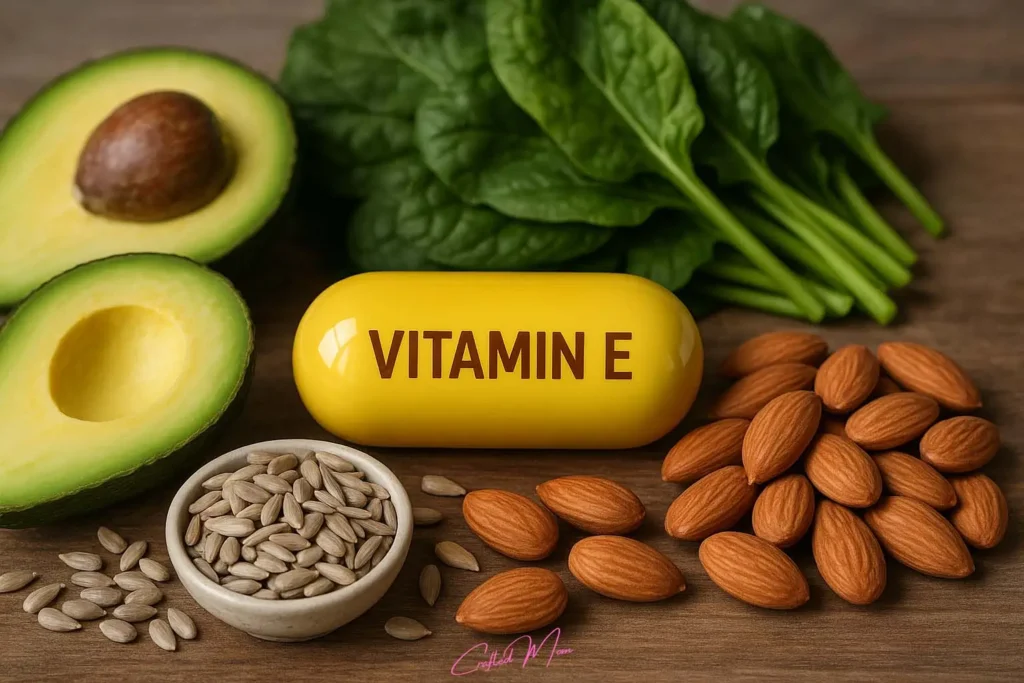
Let’s talk about vitamin E, also known as tocopherol. This essential nutrient acts as a powerful antioxidant, protecting our cells from damage and supporting overall brain health.
Why You Need Vitamin E
Vitamin E is crucial for:
- Protecting cell membranes from oxidative stress, which can lead to chronic diseases.
- Supporting brain health, with studies suggesting it may slow cognitive decline in older adults.
- Maintaining healthy skin and eyes, contributing to overall well-being.
According to the Mayo Clinic, vitamin E is important for vision, reproduction, and the health of your blood, brain, and skin. It also has antioxidant properties that protect your cells from the effects of free radicals.
Signs of Vitamin E Deficiency
- Muscle weakness and coordination difficulties.
- Numbness and tingling, indicating nerve damage.
- Vision problems, due to retinal degeneration.
Vitamin E deficiency is rare but can occur, especially in individuals with certain health conditions. Symptoms may include:
Medical News Today notes that low levels of vitamin E can lead to muscle weakness, coordination difficulties, numbness, vision problems, and more. Medical News Today
Top Food Sources of Vitamin E
Incorporate these vitamin E-rich foods into your diet:
- Sunflower seeds: A handful provides a significant portion of your daily needs.
- Almonds: Packed with vitamin E and healthy fats.
- Avocados: A versatile fruit that’s rich in nutrients.
- Spinach: Leafy greens are excellent sources of vitamin E.
Healthline highlights that vitamin E can be found in numerous foods, but especially in seeds, nuts, cooking oils, fish, and vegetables.
Or Try a Trusted Supplement:
Looking to protect your cells from stress? Nature Made Vitamin E 400 IU offers antioxidant support to help keep your body in balance.
✅ Quick Tips
- Pair vitamin E-rich foods with healthy fats to enhance absorption.
- Store oils and nuts properly to prevent oxidation and nutrient loss.
- Consult a healthcare provider before starting supplements, as excessive intake can have adverse effects.
Vitamin K: The Unsung Hero of Blood Clotting and Bone Strength
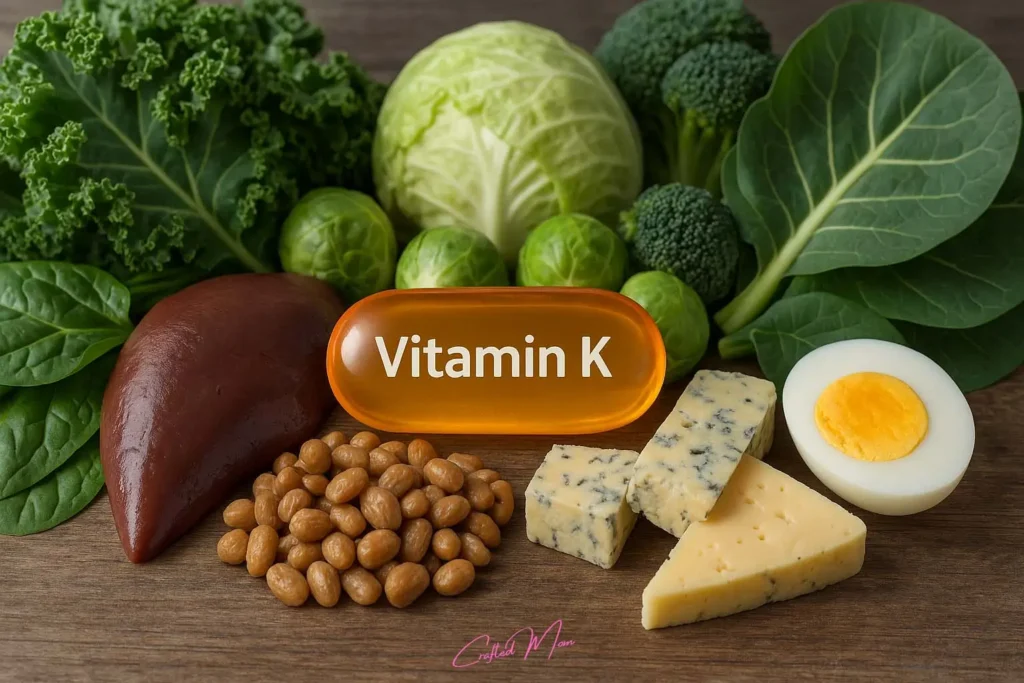
Let’s talk about vitamin K, a fat-soluble nutrient that plays a pivotal role in blood clotting and bone health. There are two main forms: Vitamin K1 (phylloquinone) found in leafy greens, and Vitamin K2 (menaquinone) produced by gut bacteria and found in fermented foods.
Why You Need Vitamin K
Vitamin K is essential for:
- Blood clotting, helping prevent excessive bleeding.
- Bone metabolism, aiding in maintaining strong bones.
- Cardiovascular health, by preventing arterial calcification.
According to the National Institutes of Health, vitamin K is required for the synthesis of proteins involved in blood coagulation and bone metabolism.
Signs of Vitamin K Deficiency
Vitamin K deficiency is rare but can lead to:
- Excessive bleeding, including easy bruising and bleeding gums.
- Osteoporosis, due to impaired bone mineralization.
- Increased risk of cardiovascular diseases, from arterial calcification.
The Cleveland Clinic notes that vitamin K deficiency can cause uncontrolled bleeding and may lead to bone and cardiovascular issues.
Top Food Sources of Vitamin K
Incorporate these vitamin K-rich foods into your diet:
- Leafy greens: kale, spinach, and collard greens.
- Cruciferous vegetables: broccoli, Brussels sprouts, and cabbage.
- Fermented foods: natto and certain cheeses.
- Animal products: liver and egg yolks.
Healthline highlights that green leafy vegetables are among the best sources of vitamin K.
Gut Bacteria and Vitamin K
Your gut microbiome contributes to vitamin K2 production, but the extent of its bioavailability is still under research. Therefore, dietary intake remains crucial.
Or Try a Trusted Supplement:
Want to support healthy bones and circulation? Bronson Vitamin K Triple Play combines K1, MK4, and MK7 for complete coverage in one capsule.
✅ Quick Tips
- Consume vitamin K with dietary fats to enhance absorption.
- Be cautious with supplements if you’re on blood thinners; consult your healthcare provider.
- Maintain a balanced diet rich in vitamin K to support overall health.
Conclusion: Getting the Right Vitamins Daily
Let’s be real, our bodies are constantly working hard, relying on a steady stream of essential vitamins to keep everything running from head to toe. From vision and mood to bone health and immunity, each vitamin plays its own superhero role. And if you’ve ever wondered why you’re always tired and how to fix it, vitamin deficiencies could be part of the answer, don’t overlook what your body might be missing.
What’s the Best Way to Get Them?
A balanced, whole-food diet is still your #1 line of defense against deficiencies. If you’re vegan, vegetarian, or dealing with medical conditions like malabsorption or anemia, you might need to get strategic with supplements or fortified foods.
When in doubt? Ask your doctor or a registered dietitian to review your intake, especially before starting any high-dose supplement.
Remember: vitamins aren’t magic pills, but they are the everyday tools your body needs to feel its best.
Have questions about your own vitamin routine or want to share your experience? Drop a comment below, I’d love to hear from you!
Frequently Asked Questions:
Why are vitamins important for our health?
Vitamins are essential nutrients that support various bodily functions, including immune health, energy production, and bone strength. Each vitamin plays a unique role in maintaining overall health.
Can I get all the vitamins I need from food alone?
While a balanced diet rich in fruits, vegetables, and whole grains can provide many vitamins, some individuals may require supplements to meet their nutritional needs, especially during pregnancy, breastfeeding, or if they have dietary restrictions.
Are vitamin supplements safe to take?
When taken as directed, vitamin supplements are generally safe. However, excessive intake of certain vitamins can lead to toxicity. It’s important to consult with a healthcare provider before starting any supplement regimen.

